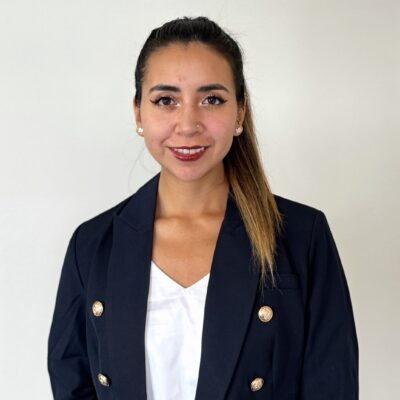Student Spotlight: Belen Sotomayor

April 28, 2025
Belen Sotomayor is a doctoral candidate in chemical engineering from Loja, Ecuador. She earned her bachelor’s degree at Universidad Tecnica Particular de Loja in Ecuador and now studies synthetic glycobiology under the guidance of Matthew DeLisa at Cornell.
What is your area of research and why is it important?
My area of research is synthetic glycobiology, which involves modifying bacteria to produce custom-designed glycoprotein molecules. These are formed by attaching complex sugars, known as glycans, to proteins. This is a natural process that affects how proteins function in the body. By recreating this process in bacteria, we can develop affordable and scalable ways to make molecules used in cancer therapies, vaccines, and other medicines. In my research, we engineered bacteria to produce a full-length glycosylated monoclonal antibody for the first time. This achievement marks a major step toward making antibody-based treatments using bacterial systems.
What are the larger implications of this research?
More than 70% of therapeutic proteins are glycoproteins, and the sugars attached to them play a key role in determining their function, effectiveness, and safety. However, glycoprotein therapeutics, such as monoclonal antibodies, are among the most expensive drugs on the market and are typically produced using costly mammalian cell systems. By engineering bacteria to produce glycoproteins, including complex antibodies, my research paves the way for building a faster and more affordable alternative. This approach could eventually transform the manufacturing of life-saving medicines and reduce costs, improving access to therapies worldwide, especially in low-resource settings.
What does it mean to you to be a Bouchet Scholar?
Being a Bouchet Scholar and a member of the Bouchet Graduate Honor Society is both an honor and a recognition of academic and personal excellence. It also carries the responsibility to lead and serve within higher education. As a Bouchet Scholar, I am committed to lifelong learning, leading with integrity, and pursuing excellence in both research and service. It also means uplifting and supporting one another to advance scientific discoveries that benefit society. I am dedicated to inspiring others to pursue careers in STEM and to helping drive innovation that leads to meaningful, lasting change across all fields of science.
How do you exemplify the five pillars of the Bouchet Society—character, leadership, advocacy, scholarship, and service?
During my Ph.D., I have taken on leadership roles that reflect the five pillars of the Bouchet Society. I was trained as a traditional chemical engineer for Ecuador’s mining industry. But through perseverance, character, and curiosity, I followed my dreams to the USA, where I learned English, transitioned into synthetic biology, and finally addressed a longstanding challenge in pharmaceutical biotechnology by enabling bacterial glycosylation of full-length monoclonal antibodies. Beyond research, I served as president of the CBE Women’s Group at Cornell, leading initiatives focused on STEM outreach for high school students in New York and promoting career development and entrepreneurship for graduate students and postdocs.
What are your hobbies or interests outside of your research or scholarship?
Outside of research, I enjoy creating content about science, career development, and graduate student life to inspire others and show that with determination and perseverance, anything is possible. I share my journey with the hope of motivating and empowering both aspiring and current scientists. I also volunteer with global student-led organizations to help build communities that promote leadership and education in biotechnology worldwide. In my free time, I love playing with my cats, going to the gym, and traveling. I also play the violin, and songs like “Romance de mi destino” bring back memories of home and my roots.
Why did you choose Cornell to pursue your degree?
I chose Cornell to pursue my Ph.D. because the program offers the opportunity to work in world-leading labs that bring together people from multiple fields, fostering innovation and creativity. These labs also collaborate extensively with other research groups within Cornell and beyond, providing students with valuable opportunities for both professional and personal growth. Additionally, I was interested in joining the student organizations, particularly in my program, which I knew would help me strengthen my leadership and soft skills outside of the lab. Cornell’s collaborative and supportive environment made it the ideal place to grow as a scientist and leader.
